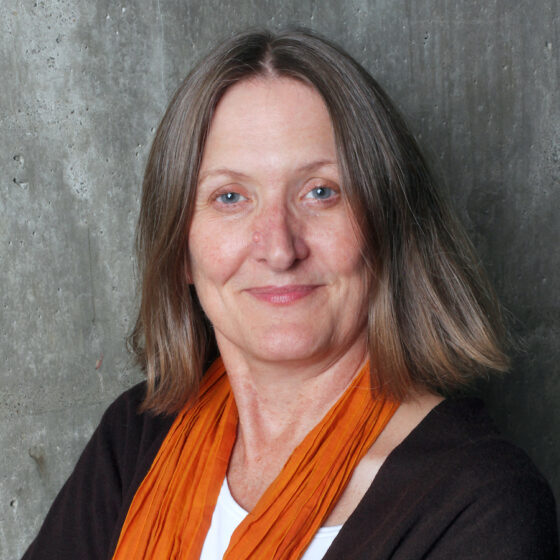Elizabeth Macdonald, scholar and designer of public urban spaces, retires
This summer, after 22 years on the faculty, Professor Elizabeth Macdonald retired from the College of Environmental Design. A scholar and urban designer focusing on public space design, she held appointments in the Department of CIty & Regional Planning and the Department of Landscape Architecture & Environmental Planning.

“Elizabeth has been an incredibly important member of our department and for many years the leader of our urban design concentration, impacting the career trajectories of hundreds of graduates of our professional programs,” says Dan Chatman, chair of the Department of City & Regional Planning. “She was also an important leader within the department and the college — her institutional knowledge and wisdom will be sorely missed.”
In her research and practice, Macdonald focuses on challenging entrenched street design standards and norms that prioritize motorized vehicle movement and designing for livability and environmental responsibility.
She is the author of Urban Waterfront Promenades and Pleasure Drives and Promenades: A History of Frederick Law Olmsted’s Brooklyn Parkways, co-author of The Boulevard Book: History, Evolution, Design of Multiway Boulevards, and co-editor of The Urban Design Reader.
Macdonald practiced urban design through her firm Jacobs Macdonald: Cityworks, in collaboration with her partner Allan Jacobs. Notable projects include the design of Octavia Boulevard to replace San Francisco’s earthquake-damaged Central Freeway and the redesign of Pacific Boulevard in Vancouver’s False Creek North neighborhood. She is the recipient of numerous design awards.
Macdonald received four degrees from Berkeley: a bachelor of arts in architecture, master’s degrees in landscape architecture and in city planning, and a PhD in city and regional planning. She taught at the University of Toronto and the University of British Columbia before joining the Berkeley faculty. Prior to entering academia, she was a registered practicing architect working with various Bay Area firms on residential, institutional, and commercial projects.
She served as the college’s associate dean for faculty affairs from 2021 to 2024, chair of the Department of Landscape Architecture & Environmental Planning from 2018 to 2020, acting chair of the Department of City & Regional Planning in 2018, and program chair of the Master of Urban Design from 2007 to 2009. Her service to campus included four years as a member of the Committee on Academic Planning and Resource Allocation and co-chair of the Chancellor’s Oversight Committee on Parking and Transportation.
— Associate Professor Carolina Reid
Macdonald’s teaching focused on different aspects of urban design. Her core and much-beloved course was the Plan Preparation Studio (CY PLAN 208), in which graduate students prepared plans and design proposals for Bay Area urban neighborhoods and movement corridors. Student work from the course often contributed to real-world planning processes.
“Elizabeth’’s commitment to her students and her joy in teaching and mentoring was evident in all her courses. She made urban design come alive, teaching students not only how to reimagine urban spaces, but also reinforcing the idea that place-making is fundamental to building more equitable cities,” says the I. Donald Terner Distinguished Professor of City & Regional Planning Carolina Reid, who serves as faculty director for the Master of City Planning.
Macdonald originated Urban Design: City-Building and Place-Making (CY Plan 140), which introduced undergraduates to urban design and was known for its field trips to urban neighborhoods where students could learn by direct looking. Other courses included CY Plan 240: History and Theory of Urban Form and CY Plan 249: Urban Design in Planning.
“Elizabeth and I share a love of urbanism and its design. Her detailed field studies of streets and waterfront promenades argue for the importance of spatial knowledge to inform both policy and design,” says William W. Wurster Dean Renee Chow. “As associate dean for faculty affairs, Elizabeth was an incredible thought partner, ensuring timeliness, equitable, and thorough faculty case reviews. We will miss her and wish her all the best in retirement.”